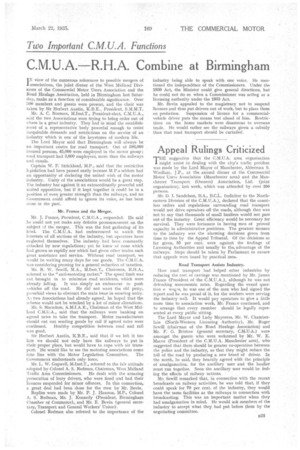Appeal Rulings Criticized
Page 37

If you've noticed an error in this article please click here to report it so we can fix it.
THE suggestion that the C.311.I.7.A. area organization Might assist in dealing with the city's traffic problem was made by the Lord Mayor of Manchester, Alderman S. Woollam, J.P., at the annual dinner of the Commercial Motor Users Association (Manchester area) and the Manchester Transport (Owners) Association, Ltd. (joint organization); last week, which was attended by over 200 persons.
Mr. D. I. Sandeison, B.A., B.C.L. (solicitor to the North
eastern Division of the declared that the countless orders and regulations surrounding road transport would not drive operators off the roads, although that was not to say that thousands of small hauliers would not pass out of the industry. Great efficiency would be necessary for survival. They were fortunate in having men of proved capacity in administrative positions. The greatest menace to the industry was the alarming decisions given from time to time by the Appeal Tribunal. Of the decisions so far given, 85 per cent, were against the findings of Licensing Authorities and usually to the, advantage of the railways. Steps should be taken by Parliament to ensure that appeals were heard by practical men.
Road Transport Assists Industry.
How road transport had helped other industries by reducing the cost of carriage was mentioned by Mr. James France (President of the C.M.U.A.), although he was not defending uneconomic rates. Regarding the vexed question o wages, he was one of the men who had signed the report and he was proud of it, for the workers were serving the industry well. It would pay operators to give a little more time to association work, Mr. France continued, and to arrange that every member should be legally represented at every public sitting.
The Lord Mayor and Lady Mayoress, Mr. W. Chamberlain (North-Western Licensing Authority), Mr. Roger Sewill (chairman of the Road Haulage Association) and Mr. F. G. Bristow (general secretary, C.M.U.A.) were amongst the guests who were welcomed by Mr. W. E. Matve (President of the C.M.U.A. Manchester area), who suggested that there should be greater co-operation between the police and the industry, so that they might reduce the toll of the road by producing a new breed of driver. In the north, he said, they heartily agreed with the 'principle of amalgamation, for the ancillary user and the haulier must run together. Soon the ancillary user would be feeling the effects of railway actions.
Mr.Sewill remarked that, in connection with the recentbroadcasts on railway activities, he was told that, if they could speak 'for 70 per cent. of the industry, they would have the same facilities as the railways in connection with broadcasting. This was, an important matter when they had amalgamation in mind. He would ask members of the industry to accept what they had put before them by the negotiating committee.




























































































